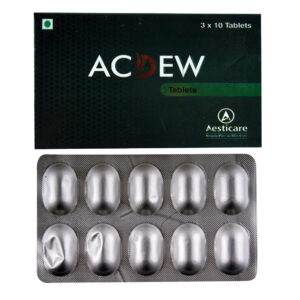VITAMIN E + VITAMIN D3 (CHOLECALCIFEROL)
Vitamin E: Vitamin E is a fat-soluble vitamin that plays a crucial role in maintaining good health. It is an antioxidant that helps protect cells and tissues from damage caused by free radicals. It is commonly found in foods such as nuts, seeds, leafy green vegetables, and vegetable oils.
The primary use of Vitamin E as a drug is as a supplement to treat Vitamin E deficiency, which is rare but can occur in individuals with conditions that impair fat absorption, such as cystic fibrosis or liver disease. It may also be used in certain rare conditions like abetalipoproteinemia.
Vitamin E’s mechanism of action revolves around its antioxidant properties. It works by neutralizing free radicals, which are highly reactive molecules that can cause cellular damage. By preventing the oxidation of lipids in the body, it helps protect cell membranes, DNA, and proteins from oxidative stress.
The recommended daily dose of Vitamin E varies depending on age, sex, and life stage. For adults, the Recommended Dietary Allowance (RDA) for Vitamin E is 15 mg (22.5 IU) per day. However, in cases of deficiency, higher doses may be required, and this should be determined by a healthcare professional.
When taken within the recommended dosage range, Vitamin E is generally considered safe and well-tolerated. However, higher doses (above 400 IU) can increase the risk of bleeding and may interfere with blood clotting. Other reported side effects include gastrointestinal disturbances like diarrhea, nausea, and stomach cramps. In rare cases, allergic reactions such as rash or itching may occur.
It’s important to note that Vitamin E supplements can interact with certain medications such as anticoagulants or antiplatelet drugs, increasing the risk of bleeding. Therefore, it is advisable to consult with a healthcare professional before starting any new vitamin supplement, especially if you are taking any prescription medications.
Vitamin D3 (cholecalciferol): Vitamin D3, also known as cholecalciferol, is a fat-soluble vitamin that plays a crucial role in the body’s absorption and metabolism of calcium and phosphorus. It is commonly used as a dietary supplement to prevent or treat vitamin D deficiency.
The primary mechanism of action of vitamin D3 is through its conversion into calcitriol, the active form of vitamin D, in the liver and kidneys. Calcitriol then binds to vitamin D receptors in various target tissues, including the intestines, bones, and kidneys. This binding enhances the absorption of calcium and phosphorus from the intestine, promotes bone mineralization, and regulates calcium and phosphorus levels in the blood.
The recommended dose of vitamin D3 varies depending on the age, health condition, and specific need of the individual. For adults, the recommended daily intake is typically between 600-800 international units (IU) but can be higher for individuals with documented deficiency. Higher doses may also be prescribed for certain medical conditions, such as osteoporosis or hypoparathyroidism.
Despite being generally well-tolerated, excessive intake of vitamin D3 can lead to toxicity, which can cause symptoms such as nausea, vomiting, constipation, weakness, and confusion. Long-term overuse may result in hypercalcemia, a condition characterized by elevated blood calcium levels, which can cause kidney stones, calcification of organs, and other complications.
It’s important to note that although vitamin D3 is available over-the-counter as a supplement, it is always recommended to consult a healthcare professional before starting any new medication or supplement to ensure appropriate dosage and to identify any potential interactions or contraindications with other medications or pre-existing medical conditions.

